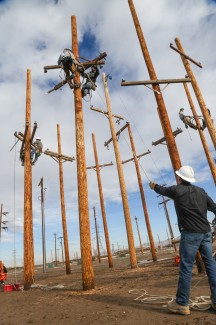Features Reporter
Photo by Mike Wong
“This industry is a young man’s industry,” WCCC instructor Pat Roark said. “Bring in the younger guys to learn and do the hard work.”
The Electric Lineworker program at WCCC has been around for many years and is set to take on new strides if and when it receives the new building that is being talked about on campus. For the time being, however, students and instructors alike takes pause as they work side by side in this nine-month certification program.
Roark explained that the school focuses on teaching students how to get power from point A to point B.
“We are worried about how to move power, not so much with generating it,” he said, although the basic principles about power generation are covered during the first semester.
“We should be able to work transformers in our sleep,” Keith Harris, a student in his second semester of the program, said. “The lab portion of the class is by far my favorite part. Actually getting the hands-on experience is why we are here.”
For electric lineworker students, the semester is broken into two different class times that run between five and six hours a day. The program consists of two semesters, the first beginning with students building confidence and gathering an understanding of basic electrical theory. In the second semester, students hone the skills they learned during the first semester. During this part of the program, instructors break the class into “three or four man crews that will work the lines under our supervision,” according to Paul Behl, instructor of the program’s class.
“Our program is 32 weeks, and that differs from some of the other schools within the state,” Behl said. “There is a divide between private and public institutions. Some offer 16-week programs.”
When asked how a proposed Utah nuclear power plant could affect students, Roark said there is talk of over 2,000 miles of power lines and bases that will need to be built the project.
“There is lots of work to be had [in this industry],” Roark said.
Each May, there is a large gathering of linemen from across the state of Colorado who participate in a professional rodeo to test their skills.
“Last year there were over 15 different areas represented at the rodeo, and it gives the students a great opportunity to talk shop with people who are actually on the line,” Roark said. “Even if a student decides not to work on the lines, he could take what is learned here and work in a power plant, substations or on different generators.”
“We all start basic, and then we grow together,” Harris said. The sense of comraderie and the opportunity to bring real-life situations to the classroom add to the education of students taking part in the Electric Lineworker program at WCCC.
ldaniel@mavs.coloradomesa.edu

Recent Comments